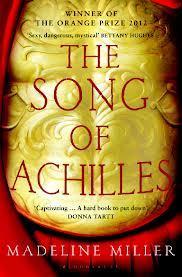 For the larger part of the Orange-Prize-winning Song of Achilles by Madeline Miller, I wondered whether I was reading the same book as everyone else. I’d seen nothing but glowing reviews about how wonderful it was, and yet I couldn’t shake the feeling that I was reading an – admittedly very well written – YA novel. If I’d had a teenage daughter, I’d have been pressing it into her hands. And I admit I was a bit concerned that a prize for women’s fiction had been given to a retelling of the Iliad that took a war-mongering masculine classic and domesticated it into a rather soppy love story. But happily my experience was redeemed by the last 50 pages, when the emotional train wreck Miller has been working up to coincides with the magnificent awfulness of the Iliad. Those last 50 pages were about as powerful as anything I’d ever read, though they are a bit of a sobfest. But still. In a story where honor is so very important, I was relieved that honor was restored to this version by the end.
For the larger part of the Orange-Prize-winning Song of Achilles by Madeline Miller, I wondered whether I was reading the same book as everyone else. I’d seen nothing but glowing reviews about how wonderful it was, and yet I couldn’t shake the feeling that I was reading an – admittedly very well written – YA novel. If I’d had a teenage daughter, I’d have been pressing it into her hands. And I admit I was a bit concerned that a prize for women’s fiction had been given to a retelling of the Iliad that took a war-mongering masculine classic and domesticated it into a rather soppy love story. But happily my experience was redeemed by the last 50 pages, when the emotional train wreck Miller has been working up to coincides with the magnificent awfulness of the Iliad. Those last 50 pages were about as powerful as anything I’d ever read, though they are a bit of a sobfest. But still. In a story where honor is so very important, I was relieved that honor was restored to this version by the end.
So The Song of Achilles is actually about Patroclus, an exiled prince who becomes Achilles’ lover and steadfast companion. Patroclus is an awkward sort, a geeky, gangly boy who’s not much good at games and lingers on the edge of life, alienated. When he kills a boy by sheer accident, he is cast off by his parents and sent to the small island of Phthia, whose king, Peleus, is known for taking in orphans and training them up for his army. His son is the half-god Achilles, a fearless, golden youth to whom everything comes easy, and who knows he is destined to be Aristos Achaion, the greatest fighter among the Greeks. By a small miracle (for Patroclus) the two become friends, though Achilles’ mother, the sea goddess Thetis, is against it from the start. She is an over-possessive, overbearing mother with the divine power to back it up. But luck favours the pair, who are sent to Chiron’s crystal cave in the mountains for training, a place protected by the centaur’s divinity from Thetis’s intruding gaze. Here, they grow into young men and become lovers. When Helen is stolen by Paris and taken to Troy, Thetis intervenes, hiding Achilles away in the hope she can prevent him from fighting in the war and fulfilling the prophecy (which comes with a galling sub-clause, as prophesies tend to do). But Patroclus finds him, and before long the Greek kings do, as well. The Iliad will not be denied, after all.
Well, so far it’s been like a really good episode of Hollyoaks or Dawson’s Creek. The reader is invited to cast the young Brad Pitt in her mind’s eye as Achilles, with someone slightly scary like Cher for Thetis. Hmm, a gorgeous young man who looks marvellous in a tunic, with a domineering mother to whom he is too bound…. Is it just me, or does that invite a certain stereotype of homosexuality? And poor old Patroclus is the misfit loner of this particularly glamourous high school. The real mystery – of why Achilles should fall in love with him at all – is left entirely enigmatic. I desperately wanted there to be a reason, some quality that Patroclus could call his own, but he’s stuck with the girl’s part of embodying nurture and devotion. I can’t figure out if that’s a win for political correctness or not.
However, once the war gets going, the tone becomes darker and more serious and some necessary growing-up is done, by Patroclus if not by Achilles. I won’t give any more details away, but the ending is absolutely heart wrenching. I’d been worried for so long with this novel that it would be about nothing but a love affair. And that seemed thin and insubstantial when compared to the heavyweight Iliad, which is about why we live and why we die, and honor and pride and sacrifice and tragedy, and so much else. But by the end, love had taken its proper place, as the best and the worst reason for acts of heroism. And that did seem like a worthy union of a feminine perspective and a deeply masculine tale.
